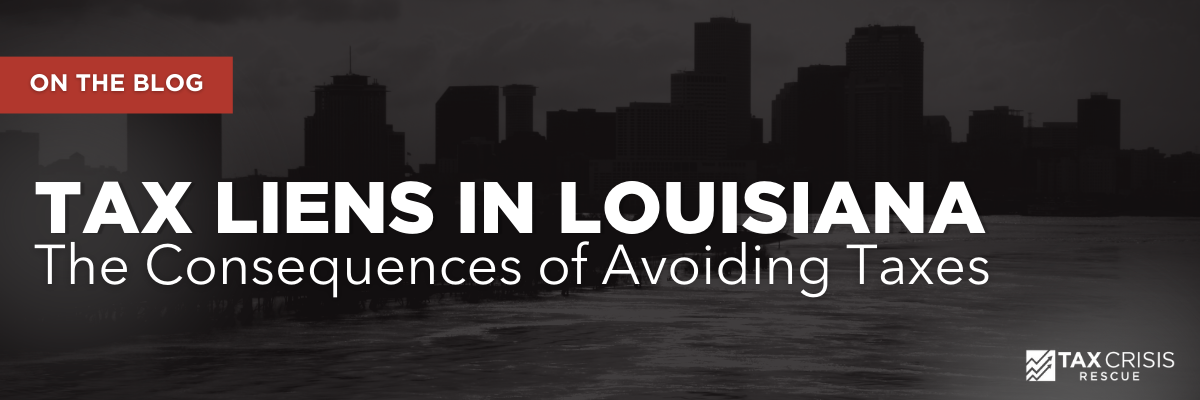What happens when you have unpaid taxes? Delinquent taxes are not something you want to leave to linger and resolve themselves, as the tax collector will always come to take what is owed on delinquent tax bills, one way or another, and compounding interest rate won’t be the only amounts collected.
Not paying your income tax has serious consequences, and one of the worst means of collecting on taxes owed affects more than your bank accounts. Did you know that the federal government can file a legal claim against all real property you currently own and even other property you may acquire in the future via the form of a federal tax lien.
Let’s take a look at what a federal tax lien is, how it affects tax debtors on the amounts owed, and what you should do if you get a certified letter saying you have one.
It’s important to note, we always recommend getting in touch with a specialized Tax Resolution Professional to negotiate with the IRS on your behalf. If you’d like to schedule a no-cost confidential tax relief consultation to discuss the delinquent amounts you owe on your tax return, contact us.
What is a Federal Tax Lien?
A federal tax lien is a document filed with a county government (Parish here in Louisiana) usually where the taxpayer lives or owns businesses notifying the general public that a taxpayer has an unpaid federal tax bill. This notice is usually given via local newspaper, adding insult to injury in letting everyone know you have outstanding taxes.
How it Affects Your Assets
A lien attaches to all of your assets (like your primary residence) and to future assets you acquire during the duration of the lien. Your property’s assessed value is what is of interest to the taxing authorities to whom you delinquent taxes.
If any of your real estate is sold to redeem the property of what you owe while you have a federal tax lien on it, the profit payment counts toward what you owe the IRS before any of it will go in your pocket.
How it Affects Your Credit
It can be difficult to recover from unpaid taxes and subsequent liens, and it will affect more than just property.
Once the IRS files a Notice of Federal Tax Lien, it’s now public record. This information is often picked up by lenders, which means the federal lien will eventually show up when you apply for a loan and could limit your ability to get credit.
Many people fight these issues with debt they owe on their individual income tax, and it grows into a much bigger problem when they decide to marry or try to purchase assets with a partner.
How it Affects Your Businesses
If you thought business taxes were tricky, the liens you incur from overdue tax amount to much more and absolutely affect your business.
The lien attaches to all business property and to all rights to business property, including accounts receivable. In the same manner that a lien on your home can be detrimental to your livelihood and wellbeing, it could severely harm your ability to run your business normally and put you further behind.
What About Filing for Bankruptcy?
Filing for bankruptcy can be a saving grace in some situations; however, it may not provide you redemption from a lien. If you file for bankruptcy, your tax bill and Notice of Federal Tax Lien may survive and continue, regardless. Like we said, the tax collector is going to get what is owed.
Is a Lien the Same Thing as a Levy?
People often use the words “lien” and “levy” interchangeably, but they’re not the same thing. They are very different. A federal tax lien is the government’s legal claim of interest in all your property. They don’t sell off or forcefully confiscate the property, but it can definitely make your life a lot harder having the IRS put a chain on everything you own.
A levy is the enforcement of the lien via enforced collection of tax. For example by confiscating money directly out of bank accounts or garnishing up to 75% of your net paycheck.
What’s My Next Step with Unpaid Taxes?
The IRS website says paying your tax liability – in full – is the best way to get rid of a federal tax lien. The IRS releases your lien within 30 days after you have paid your tax debt.” However, most people can’t take out their checkbook and fully pay the amount of the debt in full. That’s where a Tax Resolution Specialist can help.
Contrary to the IRS’s advice, a tax debtor in this situation should first call a qualified tax resolution professional. Dealing with the IRS yourself is like going to court without a lawyer. Sure you could absolutely do it, but your chances of having a favorable outcome in the final determination are slim.
A qualified tax resolution professional can lay out a resolution plan, get on the phone with the IRS immediately on your behalf, begin negotiations to relieve your tax problem. There are many options to get back in compliance with IRS, including installment request, payment plans, and more for redemption, attainable lien payoff, and lien release.
New Orleans, Louisiana’s Taxpayer Defender
Reach out to our firm in New Orleans, Louisiana and we’ll schedule a no-obligation, confidential consultation to explain your options to permanently resolve your tax bill problem. Redemption is within your reach.

